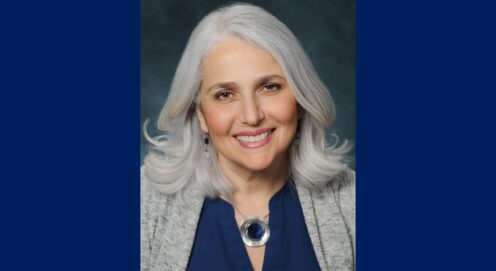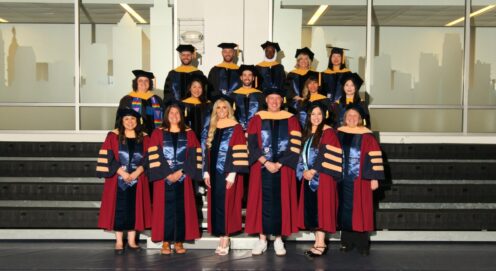RESEARCH
The Data for Equitable Justice Lab
Data for Equitable Justice Lab is a research course that gives SP2 Master’s students an opportunity to analyze some of today’s most important social issues through data and, with instructor support, create a product for audiences well beyond the classroom. With guidance from lab instructors, students develop a project – either individually or as part of a team – to examine a contemporary social policy issue through the use of data, or to examine a social justice issue that concerns data or digital technology. In these projects, students will produce an op-ed, blog post, podcast, academic article, short film, or other product of their choosing that creates or contributes to contemporary policy discourse. This course helps students produce a data-focused work product that they can build on during their Capstone seminar.
Research Projects
The Data for Equitable Justice Lab offers students the opportunity to develop a project that connects their own interests to their classroom learning to impact public policy and the conversations that surround them. View examples of prior students’ projects below.
Examining Colorism Among Female African American Exotic Dancers in Philadelphia and Neighboring Counties
Rose Brown
In this novel study, SP2 MS in Nonprofit Leadership student Rose Brown sought to understand colorism – the impact of skin tone on how someone is treated – among a highly vulnerable population. She visited exotic dance clubs in and around Philadelphia, speaking to 50 dancers who shared their experiences with discrimination by customers, management, and fellow dancers.
India’s #MeToo
Shweta Chopra & Sanjana Dalmiya
While US media coverage of the #MeToo movement has been focused on sexual assault and harassment in the United States, the underlying problems know no boundaries. Shweta Chopra and Sanjana Dalmiya conducted a thorough examination of the #MeToo movement in India, poring through hundreds of news articles to understand similarities and differences between these critical movements in the US and India.
The Legacy Project: Celebrating the Pan-Asian Professionals in the Social Work Field
Julia Hah
Noting the underrepresentation of Asian-Americans in the social work field, Julia Hah undertook a qualitative study to understand their unique challenges to a social work career. In interviewing three social workers, she discovered a mix of familial and societal pressures that disproportionately push Asian-Americans toward higher paying, higher prestige careers which she masterfully documented in this presentation.
The Legacy Project: Celebrating the Pan-Asian Professionals in the Social Work Field
The Effect of Medicaid Expansion on Health Service Accessibility
Xiaorui (Mia) Hou & Xiaoxuan He
Medicaid expansion is among the most significant and controversial efforts contained in the Affordable Care Act to improve access to quality healthcare among vulnerable populations. In this study, Mia and Xiaoxuan take advantage of the natural experiment embedded in Medicaid expansion’s roll-out to assess its impact on the percent of people who did not see a doctor because they could not afford care.
The Effect of Medicaid Expansion on Health Service Accessibility
Implicit Bias Research in Police Training
Michelle Johnson
“Implicit bias” has become ubiquitous as a term to describe part of the problem underlying strained relationships between law enforcement and racial minority communities, particularly the black community, but its use and source of a solution has gone largely unscrutinized. SP2 Master of Social Work student Michelle Johnson dove into the research and found that current approaches to reducing implicit bias are unlikely to have any impact on excessive force by law enforcement or relationships between police departments and minority communities more generally.
Quantifying the Unknown: Data Limitations for Youth with Experience in Foster Care Attending Post-Secondary Education
Kathryn Kirkman
The Pennsylvania state legislature is once again considering funding the college educations of youth with experience in foster care but understanding the potential scope and cost of this effort is a hefty challenge. Luckily, it’s one that Kathryn Kirkman is eager to take on. Using the limited data available on the topic, she created robust estimates of the potential cost of this legislation and, in doing so, created a guide for others looking to create similar projections in other states and in the future.
Quantifying the Unkown: Data Limitations for Youth with Experience in Foster Care Attending Post-Secondary Education
What’s In a Degree? How Graduate Programs Shape Career Decision Making for the Public Sector
Madeleine O’Brien
Many students seek public service degrees only to change their minds partway through their program. Madeleine O’Brien surveyed and interviewed nearly 200 students and alumni to understand what motivations brought them into the program and how those ambitions and priorities change during their academic careers, with lessons for programs that seek to increase their policymaking footprint.
Quantifying the Unkown: Data Limitations for Youth with Experience in Foster Care AtWhat’s In a Degree? How Graduate Programs Shape Career Decision Making for the Public Sector
Ten Years of Affirmative Action in Ecuador: a failure or success for post-neoliberal policies?
Hannah Watson
Ecuador has moved sharply away from neoliberal economic policies over the last ten years, with particular effort toward ensuring greater opportunities for indigenous groups through affirmative action policies. Hannah traveled to Ecuador to meet with representatives of two indigenous groups to examine the effects of those affirmative action policies and to explore next steps toward increased opportunity toward those groups.
(Un)Civil Education for Civic Engagement: The Case of Florida
Christine Pappas
In November, 2018 Florida voters overwhelmingly approved Amendment 4, which returned voting rights to the state’s 1.4 million individuals released from prison after felony convictions. This is a huge leap forward, but state legislators are already trying to undermine it. Christine Pappas walked us through the historic referendum in the context of a history of racially motivated disenfranchisement and offered a guide for how every Floridian can help ensure universal voting rights.
(Un)Civil Education for Civic Engagement: The Case of Florida
The Post-Incarceration Cycle of Poverty
Anna Worrell & Andreana Barefield
It is no secret that incarceration impacts an individual’s life long after a sentence has officially ended. Anna and Andreana examined how the criminal justice system perpetuates poverty and, in doing so, increases the probability of re-incarceration. They delved into the excessive fees paid by those on probation and parole, including “supervision fees” paid by anyone who sees a probation and parole officer, and the punitive and life-destroying fines should someone fall behind. Stay tuned for the upcoming podcast devoted to this topic!
News
Alumni
07/17

Alumni Q&A | Rosemary (Rosie) Frasso, PhD ’11
SP2 alumna Rosemary (Rosie) Frasso, PhD ’11, is a health equity researcher, public health educator, and the Victor Heiser, MD Professor of Population Health at Jefferson’s College of Population Health. We reached out to her to learn more about her time at SP2 and her path to advancing health equity through research and education.
News
Faculty & Research
06/17

Report: Newark guaranteed income pilot shows positive financial, health, family, and housing impacts
New research from the Center for Guaranteed Income Research (CGIR) at Penn’s School of Social Policy & Practice (SP2) offers insight into the efficacy of different forms of unconditional cash transfers and reveals the positive impact of guaranteed income on low-income families in Newark, NJ.
News
Student Life
06/13

SP2 celebrates 2025 Doctorate in Clinical Social Work graduates
At the 2025 Commencement ceremony for Penn’s School of Social Policy & Practice (SP2), eighteen students were awarded their Doctorate in Clinical Social Work (DSW). As part of the ceremony on Saturday, May […]